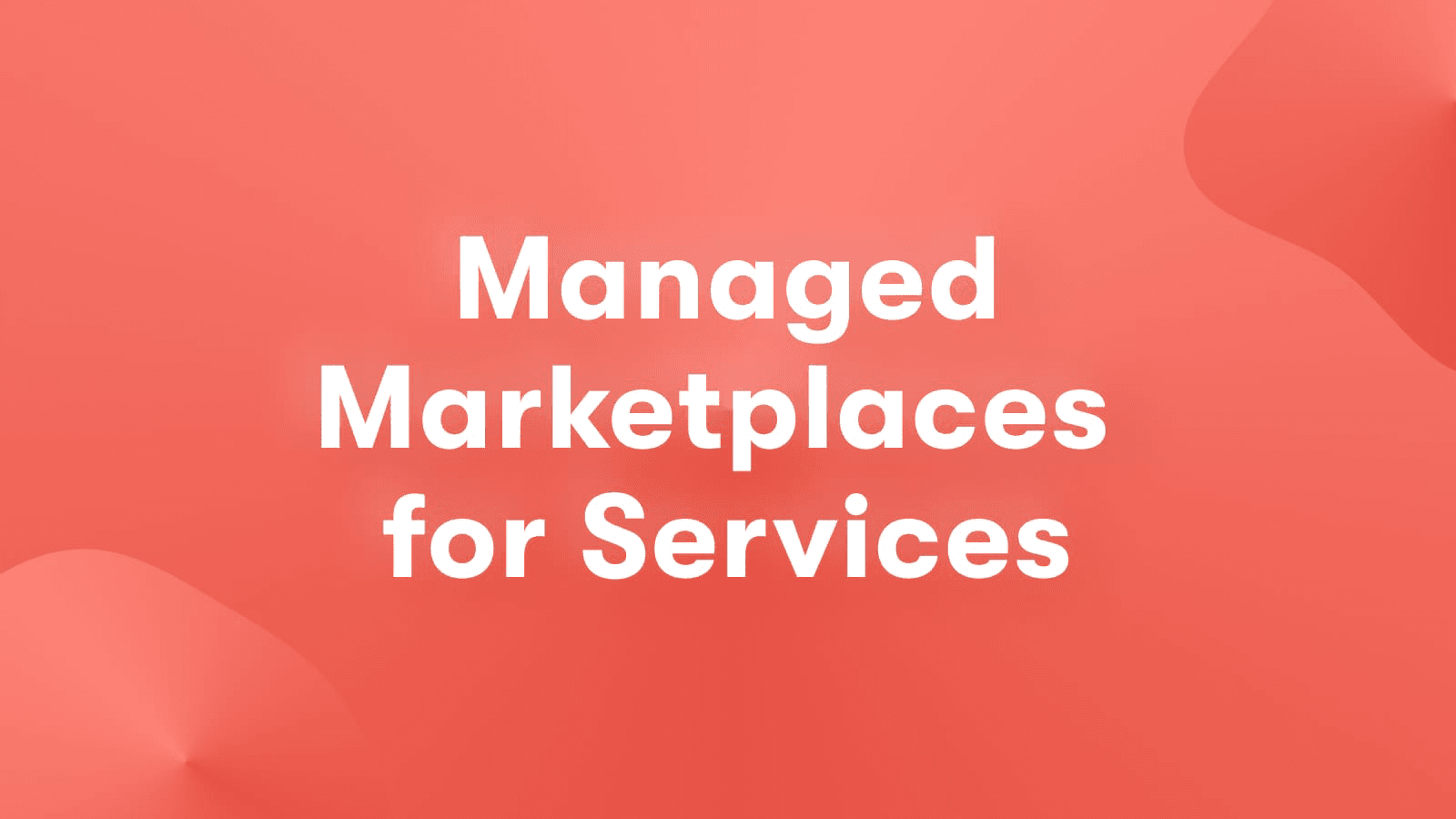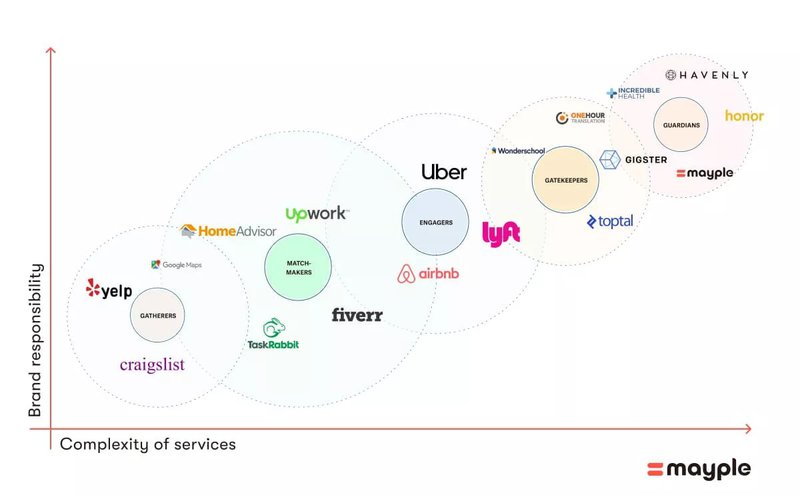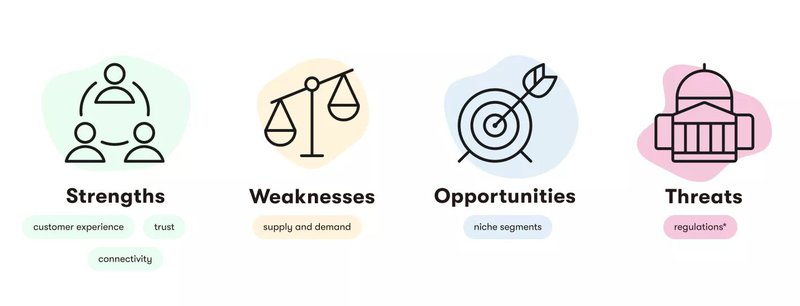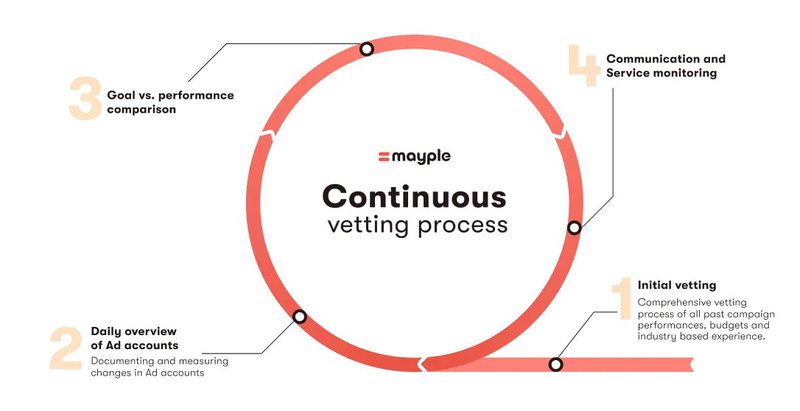Managed Marketplaces for Services - Unlocking Success
Future opportunities for service oriented and B2B Managed Marketplaces. How can you benefit from this latest commerce trend?
Published November 5, 2024.

Have you heard the expression “it’s the Uber for...” or “it’s the Airbnb for...”.
Iconic companies like Uber and Airbnb have spurred so much innovation in the way companies sell goods and services that there are literally hundreds of firms that use that business model today.
This is what’s known as the managed marketplace model.
Surprise, surprise!
Mayple is also a managed marketplace, and we are super proud of it. Andreessen Horowitz (known as "a16z"), the biggest venture capital firm in the world, based in Silicon Valley, has invested and grown tens of such marketplaces in a variety of industries.
In this post, we break down the true meaning of what a managed marketplace is, highlight some of the leading players in this industry, and offer a few tips on what we’ve learned from our journey.
What is a managed marketplace?
A managed marketplace is an online platform that services both buyers and sellers by connecting them together and building features that increase the ease of making transactions.
The prequel to this idea were unmanaged marketplaces, places like Craigslist or the Yellow Pages, that were mere bulletin boards. They merely displayed information in a more convenient way.
Examples of managed marketplaces include companies like Amazon, the AWS marketplace, Airbnb, Handshake, Rigup, Ladder, Lambda School, and others. Most marketplaces are only “lightly managed” today. It’s hard to find a true marketplace that adds value to both sides of the transaction.
Speaking about value, what’s so special about these online marketplaces?
Why are managed marketplaces becoming so popular today?
The world of consumerism has tremendously evolved over the past 3 decades. Consumption of goods and services has shifted to digital marketplaces and has become more acceptable than ever before. We can order nearly anything online: food, apparel, electronics, appliances, luxury products, furniture, and even cars.
We’re seeing a lot of developments in service marketplaces as well. It’s estimated that services make up 69% of national consumer spending in the US and the Bureau of Economic Analysis estimates that only 7% of services are primarily digital.
So we’re going to see a huge wave of new businesses who are going to take advantage of this gap and help create digital assets and better processes for the $2 trillion service economy.
This digitalization has been trickling down from tech to other intangible services over the past decade. Nowadays, you can pay for someone else's time and talent to complete tasks you need to get done: dog walking, food delivery, laundry services, consulting services of any kind, etc.
These new service marketplaces have given way to the emerging “passion economy” (a.k.a the talent economy). Emerging digital platforms allow pretty much anyone to monetize their unique skills and turn their passions and ideas into a full-time job.
It is also a great equalizer in today’s fragmented and globalized economy, where service providers can be “judged” on the actual quality of their work and their skills, and less on gender, race, religion, age, or physical proximity.
The opportunities for growth and success to all involved: customers, businesses and entrepreneurs’ possibilities seem limitless.
And that’s where the marketplace model comes into play.
Focusing on Managed Marketplaces for Services
The Managed Marketplace model we are referring to is in fact just the most recent development of the Marketplace business model. As of the past 5 years, Managed Marketplaces have gone beyond just facilitating the customer-provider relationship to actively moderating its quality.
By adding quality of service management and ongoing monitoring abilities to the demand and supply relationship, managed marketplaces are able to build customer trust. This, in turn, increases the likelihood of customer satisfaction, loyalty, and subsequent business growth for the marketplace and its customers.
Rather than just enabling customers to discover and build trust with the end provider, these marketplaces take on the work of actually creating trust. — Andreessen Horowitz
With Managed Marketplaces minimizing customer uncertainty, previously off-line services and more complex business transactions (like B2B’s) where the risks are higher (size of the transaction and potential impact) can be “converted” to online solutions as well.
Online managed marketplaces are potentially the next great leap forward for the global job market. This growing business model can create new job opportunities, restructure the employer-employee relationship, enable professionals to work from remote locations over the world, and support a healthier work-life balance.
Service providers (from freelancers to big companies) within managed marketplaces can conveniently generate new business and grow faster, while supported by a marketplace that conveys trust and provides the required operational capabilities and experience their customers would expect.
Consumers benefit from a better customer experience all around within a managed marketplace. The service is faster and more cost-effective. Finding the right service provider is more accurate, top service providers are more accessible, and the level of service is guaranteed by the marketplace itself.
Mayple, for example, as a Managed Marketplace for B2B services, matches and manages the relationship between SMB’s and digital marketing service providers. We cater to businesses in need of professional marketing services and provide the business results they couldn’t otherwise obtain.
While, in turn, enabling marketing service providers to grow using our facilitating platform to recruit and manage their business clients. We are able to guarantee high-quality service and build trust by vetting the marketing service providers we allow into the marketplace.
We also use our own AI algorithms to make the right match between the business and the marketing service provider.
We remain an objective third party of the business interaction throughout its duration providing both the platform and the guidance so both sides of the deal benefit.
Now let’s talk about the pros and cons of managed marketplaces.
Benefits of managed marketplaces
Here are some of the benefits that managed marketplaces for both buyers and service providers.
Lower prices
The managed model introduces a lot of efficiency into the process and helps lower prices across many industries. Marketplaces are able to lower acquisition costs and unlock supply efficiencies, unlike regular businesses.
Better regulation & quicker licensing
Marketplace companies in heavily regulated industries gain an advantage by creating faster regulatory and licensing processes. In the construction & energy industry, for example, marketplace startups like Rigup had to create a faster certification process and centralized place where construction workers could keep their certifications.
Higher quality
Marketplaces have a network effect of gathering the best minds and service providers. This only happens if they focus on the quality from the get-go. Once a network of highly qualified experts is in place, the marketplace is able to offer a differentiated experience for its customers. This sometimes involves building a product platform that really scales with customer demand.
The challenges associated with managed marketplaces
On the other hand, there are many challenging factors to consider when building managed marketplace companies.
Hard to manage the supply
Marketplace startups really need to focus on building the supply chain. They need to gather enough licensed providers that are background checked and meet quality standards. If they offer unlicensed supply or run out of service providers then it will get really hard to grow and acquire more customers.
One of the biggest challenges for marketplaces is to grow a licensed supply pool fast enough to be able to service a variety of customers. This is even harder to do if the marketplace targets a niche market.
User experience has to be perfect
Besides quality assurance, marketplace startups have to offer an experience that absolutely wows the user. We see that with the Ubers, Airbnbs, and other startups from Silicon Valley, that are known for having some of the best UX on the planet. If the user experience isn’t perfect then it can significantly slow down customer acquisition.
High development costs
The advantage of building a managed marketplace is the virtually nonexistent human capital costs but on the flip side, the development costs can go through the roof. You’re really building a platform from scratch that has to be technologically advanced enough to provide value to both the supply and the customer side.
6 tips to building the perfect managed marketplace for services
1. Develop the right matching process
With B2B the risks for marketplace customers are much higher, (compared to B2C Marketplaces). With a B2C service like Uber, marketplace customers could care less who their driver is, as long as they can get them from point A to point B safely and swiftly.
However, risking a bad match between a business and a service provider could end up costing the hiring company dearly. Many B2B interactions are long term and finding the right match can be critical to a business’s growth. That is why managed marketplaces should devote a lot of strategic thought to this initial marketplace functionality.
2. Guarantee the quality of the work
Marketplaces should create an internal certification process to establish trust with their audience. For Managed Marketplaces, where suppliers must be licensed or certified (engineers, accountants, teachers, lawyers), the initial burden of proof is slightly lifted with an external guarantee to instore trust.
However, the opportunity for a marketplace to excel lies with its ability to vouch for its service providers' performance throughout the business engagement and beyond the initial qualification sorting.
3. Take advantage of SaaS solutions in your industry
If our predictions are true, in the upcoming years we’ll see a convergence of SaaS management platforms to a select 3-5 that will be in use per industry. For instance, all design service providers will end up using one of 3 dominant software to create graphics, website mock-ups, print layouts, etc.
And we envision this happening across other service industries as well (healthcare, content marketing, real estate, HR organizations, accounting services). It’s a good trend in our opinion and will make it easier for marketplaces to connect and integrate these tools in order to view the activity on them as part of the quality assurance offering of the managed marketplace.
In fact, this is already true in the digital marketing industry, where marketers commonly use the same advertising platforms: Facebook, Google Ads, Linkedin, Taboola, Outbrain, and Bing, just to name a few.
4. Make continuous quality of service a core value
A B2B marketplace for services needs to be able to guarantee their clients that their matched service providers have the relevant expertise they need and that their quality of work will not diminish over time.
With B2B marketplaces where the business relationship is long-term rather than a one-time transaction, there is added monetary value in retaining a customer and keeping them satisfied. By stressing continuous improvement as everyone's priority, everyone flourishes.
5. Keep business customers active in your marketplace
As B2B Marketplace customers grow, so will their business needs and with it the services they’ll require. The key opportunity here, for marketplaces, is to be able to provide their customers with a way to switch up or change service providers within the marketplace platform along with their changing needs.
Enabling marketplace customers to switch service providers within the marketplace platform increases the customer’s LTV (lifetime value).
6. Build a marketplace community to build your brand
Adopt some good practices from social networks, and look beyond just being a great business solution.
Offer your B2B marketplace users an active community, where they can access professional knowledge to improve and make use of exclusive (and otherwise costly) software tools to support their work. And make sure it is easy and enticing for them to generate new and recurring business referrals on your behalf.
A lot of [marketplaces] are offering a value proposition of not just making money, but actually doing work that has some creative element and allows people to express themselves - Li Jin, Founder of Variant, ex-partner at a16Z
Recap
Managed Marketplaces for services essentially take on the real-world business process of hiring to managing and have digitized it, changing the global job market in the process.
Once B2B’s and service providers find ways to become trustworthy enough to minimize the sense of risk for their customers, this will become common practice, and there will be no turning back, nor will there be a need to.






![What Is Marketing? [The Only Guide You'll Ever Need Again]](https://entail.mayple.com/en-assets/mayple/fit-in/280x280/marketing_tactics-1725963852777.jpg)
